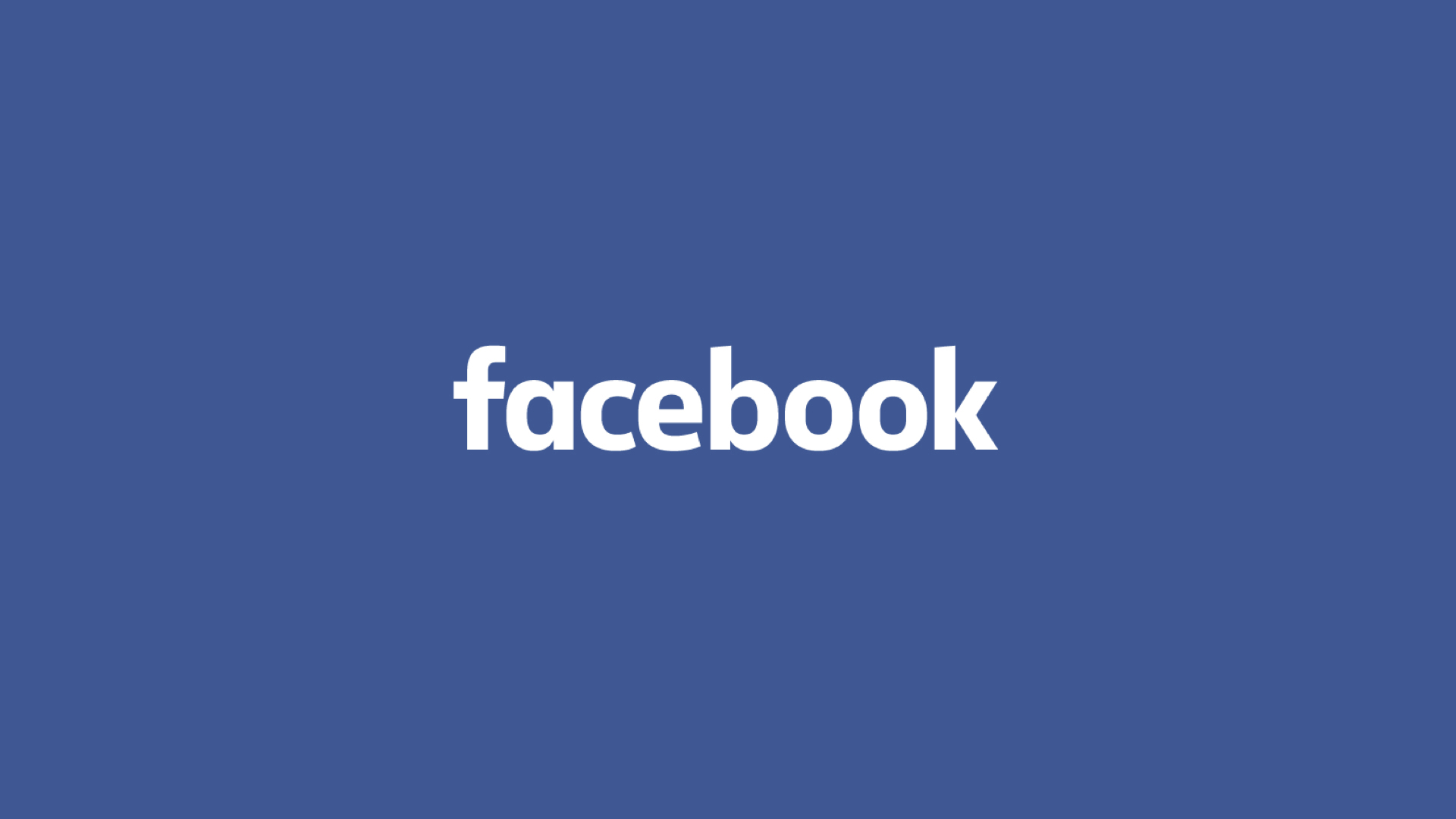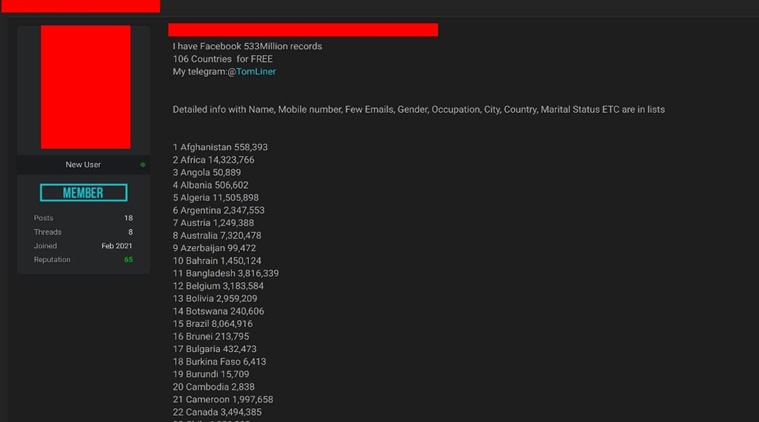Explained: What’s unique about leak of 533 million Facebook accounts, how are Indian users affected, should you worry?
Explained: What’s unique about leak of 533 million Facebook accounts, how are Indian users affected, should you worry?on Apr 12, 2021

 A graphical representation of the number of people from the four metro cities of India who were targetted.
Troy Hunt, a security expert who runs HaveIBeenPwned, an online service for users to check if their information has been involved in a data breach, told indianexpress.com what makes the data set unique is the huge number of phone numbers that have been leaked. “Whenever there are data leaks of this nature, there are usually more email addresses. But in this case, a lot of phone numbers mapped to the Facebook account of users have been leaked. So, what you have now is like a giant global phone book which is available out there on the public domain,” he said.
Where did the leaked data first become available?
The massive database containing the personal information of over 500 million Facebook users was first posted on the dark web — a haven for illegal activities and stolen information ranging from the sale of data to hacking tools to drugs and weaponry—for free, enabling cybercriminals from all over the world to exploit the data to target Internet users worldwide.
A graphical representation of the number of people from the four metro cities of India who were targetted.
Troy Hunt, a security expert who runs HaveIBeenPwned, an online service for users to check if their information has been involved in a data breach, told indianexpress.com what makes the data set unique is the huge number of phone numbers that have been leaked. “Whenever there are data leaks of this nature, there are usually more email addresses. But in this case, a lot of phone numbers mapped to the Facebook account of users have been leaked. So, what you have now is like a giant global phone book which is available out there on the public domain,” he said.
Where did the leaked data first become available?
The massive database containing the personal information of over 500 million Facebook users was first posted on the dark web — a haven for illegal activities and stolen information ranging from the sale of data to hacking tools to drugs and weaponry—for free, enabling cybercriminals from all over the world to exploit the data to target Internet users worldwide.
 A screenshot of the data available on the dark web.
Initially, operators of the database allowed Telegram users to query the database in exchange for a fee, enabling the latter to view phone numbers associated with millions of Facebook accounts. However, things got much worse recently when a hacker made the entire database available on a dark web forum for free, enabling anyone with basic data skills to view the personal information of 533 million Facebook users.
Dave Walker told indianexpress.com that the data was available across a couple of forums, both on the dark web and other sharing platforms. “Users of this data tend to hide their identity, particularly if they are using it for illegal activities. Across the world, the laws vary and even academic research can be impacted by this concern. Each time the databases are sold, the value decreases as the data becomes both older and less rare. The individual that made this data available claims to have paid $10,000 and that would seem to be an accurate price, but people who had bought it earlier are likely to have paid much more,” he said.
When asked as to why users tend to make such valuable data available for free, Walker said, “Users will often do this to sell it cheaply in large volume, or increase their reputation on the platforms. I’m not comfortable with directing people directly to where this data is available, but someone motivated to find it would not find this a challenge.”
What can this leaked data be used for?
Privacy has been the biggest casualty as a result of this leak, with personal information such as phone numbers and addresses of many people now available in the public domain.
Security experts have said that the leaked data can be used for phishing attacks, sending spam over text messages, marketing calls and targeted advertising.
Moreover, phone numbers being publicly available is of particular concern at a day and age when they are used widely for identity verification. Most digital services, including online payments, nowadays require phone numbers where authentication codes are sent for verification.
Dave Walker said that the biggest threat is probably phishing, where accurate data can be included in the spam messages to add credibility to the attack.
“As the data is well-structured, it is very easy for an attacker to consume this data in a mass phishing attack. However, many platforms use mobile phone numbers as MFA (Multi-factor authentication) or as part of account recovery. I would expect to see some abuse of this, including attempts to steal peoples phone numbers in an attempt to get access to additional accounts for individuals,” he said.
“Further, there is a risk of unsolicited contact for high profile individuals, celebrities and vulnerable people. As an example, we were able to discover a number of high-profile individuals phone numbers, including the founder and CEO of Facebook himself,” he added.
Agreeing with him, Mikko Hyppönen, a security expert and the Chief Research Officer at F-Secure, a global cybersecurity firm, told indianexpress.com, “The biggest damage in these cases is done to politicians, celebrities, law enforcement officers, judges and people with abusive ex-partners. People who have a valid reason to try to keep their phone numbers hidden have had it exposed, thanks to Facebook.”
He added: “Facebook is assuring us that this is not that bad as your phone number was not obtained by hacking but by scraping. But for users who try to maintain an unlisted number, the distinction between hacking and scraping might not feel that important.”
Mukesh Choudhary, the Chief Technical Officer associated with Jaipur Police’s cybercrime cell, said the most used modus operandi when it comes to data leaks of this nature is marketing, wherein hackers segregate the stolen data, profile them according to cities, age, sex or paying capacities and sell it to companies and even political parties. “Cybercriminals also often use this data to hit and run profiles. This means they use the phone numbers obtained from the breach as the user id or password to enter someone’s profile and then demand money in return. This is a very common occurrence in the last few years in India. Sometimes, when they come across numbers belonging to VVIPs, they sell it at a good cost,” he added.
What has been Facebook’s response and what do security experts say?
In the blog post, Facebook’s Mike Clark stated what has been leaked online is an old data set that was obtained through scraping in 2019. The statement read, “This is another example of the ongoing, adversarial relationship technology companies have with fraudsters who intentionally break platform policies to scrape internet services. As a result of the action we took, we are confident that the specific issue that allowed them to scrape this data in 2019 no longer exists.”
It added, “We believe the data in question was scraped from people’s Facebook profiles by malicious actors using our contact importer prior to September 2019…When we became aware of how malicious actors were using this feature in 2019, we made changes to the contact importer. In this case, we updated it to prevent malicious actors from using software to imitate our app and upload a large set of phone numbers to see which ones matched Facebook users.”
Even though Facebook stated that only information that was public on the platform when the scraping took place has been compromised, security experts have pointed out that even people who set their phone number visibility to private were affected by the leak.
Most security experts the indianexpress.com spoke to said that with the amount of data Facebook possesses, safety will always be a big concern and a leak of this nature will not be the last. Almost confirming their fears, a fresh data set of breached Facebook accounts has now emerged online, which can be accessed through a new Telegram bot that in return for money unmasks the phone numbers of Facebook users that liked a specific Page, the Vice reported.
Raj Samani, Chief Scientist at cybersecurity firm McAfee, told indianexpress.com what remains a big concern for everyone is that the leaked data of millions of users is so readily available online now. “The position of Facebook has been challenged, and their response that they found and fixed the issue is unlikely to be comfortable to the millions of people whose personal data is now accessible and could well be used by scammers. The data that has been made available are the sorts of things we cannot change easily. And that is why this data dump is of immense value to criminals,” he said.
Troy Hunt agreed that even if this data is old, it is immutable — people very rarely change their addresses, phone numbers or many other details which were part of the leak.
“Facebook has said the data was scrapped in violation of their terms of service. But that is not going to help. Criminals who exploited a vulnerability are not going to be bothered about a company’s terms of service. Obviously, Facebook wants you to share more and more data. And the importance of using social media to stay connected during a global pandemic cannot be understated. It’s also true that the social media giant is investing a lot of money into anti-scrapping technologies. But when you have so much data, the challenge is to keep it safe,” he said.
Source: indianexpress
A screenshot of the data available on the dark web.
Initially, operators of the database allowed Telegram users to query the database in exchange for a fee, enabling the latter to view phone numbers associated with millions of Facebook accounts. However, things got much worse recently when a hacker made the entire database available on a dark web forum for free, enabling anyone with basic data skills to view the personal information of 533 million Facebook users.
Dave Walker told indianexpress.com that the data was available across a couple of forums, both on the dark web and other sharing platforms. “Users of this data tend to hide their identity, particularly if they are using it for illegal activities. Across the world, the laws vary and even academic research can be impacted by this concern. Each time the databases are sold, the value decreases as the data becomes both older and less rare. The individual that made this data available claims to have paid $10,000 and that would seem to be an accurate price, but people who had bought it earlier are likely to have paid much more,” he said.
When asked as to why users tend to make such valuable data available for free, Walker said, “Users will often do this to sell it cheaply in large volume, or increase their reputation on the platforms. I’m not comfortable with directing people directly to where this data is available, but someone motivated to find it would not find this a challenge.”
What can this leaked data be used for?
Privacy has been the biggest casualty as a result of this leak, with personal information such as phone numbers and addresses of many people now available in the public domain.
Security experts have said that the leaked data can be used for phishing attacks, sending spam over text messages, marketing calls and targeted advertising.
Moreover, phone numbers being publicly available is of particular concern at a day and age when they are used widely for identity verification. Most digital services, including online payments, nowadays require phone numbers where authentication codes are sent for verification.
Dave Walker said that the biggest threat is probably phishing, where accurate data can be included in the spam messages to add credibility to the attack.
“As the data is well-structured, it is very easy for an attacker to consume this data in a mass phishing attack. However, many platforms use mobile phone numbers as MFA (Multi-factor authentication) or as part of account recovery. I would expect to see some abuse of this, including attempts to steal peoples phone numbers in an attempt to get access to additional accounts for individuals,” he said.
“Further, there is a risk of unsolicited contact for high profile individuals, celebrities and vulnerable people. As an example, we were able to discover a number of high-profile individuals phone numbers, including the founder and CEO of Facebook himself,” he added.
Agreeing with him, Mikko Hyppönen, a security expert and the Chief Research Officer at F-Secure, a global cybersecurity firm, told indianexpress.com, “The biggest damage in these cases is done to politicians, celebrities, law enforcement officers, judges and people with abusive ex-partners. People who have a valid reason to try to keep their phone numbers hidden have had it exposed, thanks to Facebook.”
He added: “Facebook is assuring us that this is not that bad as your phone number was not obtained by hacking but by scraping. But for users who try to maintain an unlisted number, the distinction between hacking and scraping might not feel that important.”
Mukesh Choudhary, the Chief Technical Officer associated with Jaipur Police’s cybercrime cell, said the most used modus operandi when it comes to data leaks of this nature is marketing, wherein hackers segregate the stolen data, profile them according to cities, age, sex or paying capacities and sell it to companies and even political parties. “Cybercriminals also often use this data to hit and run profiles. This means they use the phone numbers obtained from the breach as the user id or password to enter someone’s profile and then demand money in return. This is a very common occurrence in the last few years in India. Sometimes, when they come across numbers belonging to VVIPs, they sell it at a good cost,” he added.
What has been Facebook’s response and what do security experts say?
In the blog post, Facebook’s Mike Clark stated what has been leaked online is an old data set that was obtained through scraping in 2019. The statement read, “This is another example of the ongoing, adversarial relationship technology companies have with fraudsters who intentionally break platform policies to scrape internet services. As a result of the action we took, we are confident that the specific issue that allowed them to scrape this data in 2019 no longer exists.”
It added, “We believe the data in question was scraped from people’s Facebook profiles by malicious actors using our contact importer prior to September 2019…When we became aware of how malicious actors were using this feature in 2019, we made changes to the contact importer. In this case, we updated it to prevent malicious actors from using software to imitate our app and upload a large set of phone numbers to see which ones matched Facebook users.”
Even though Facebook stated that only information that was public on the platform when the scraping took place has been compromised, security experts have pointed out that even people who set their phone number visibility to private were affected by the leak.
Most security experts the indianexpress.com spoke to said that with the amount of data Facebook possesses, safety will always be a big concern and a leak of this nature will not be the last. Almost confirming their fears, a fresh data set of breached Facebook accounts has now emerged online, which can be accessed through a new Telegram bot that in return for money unmasks the phone numbers of Facebook users that liked a specific Page, the Vice reported.
Raj Samani, Chief Scientist at cybersecurity firm McAfee, told indianexpress.com what remains a big concern for everyone is that the leaked data of millions of users is so readily available online now. “The position of Facebook has been challenged, and their response that they found and fixed the issue is unlikely to be comfortable to the millions of people whose personal data is now accessible and could well be used by scammers. The data that has been made available are the sorts of things we cannot change easily. And that is why this data dump is of immense value to criminals,” he said.
Troy Hunt agreed that even if this data is old, it is immutable — people very rarely change their addresses, phone numbers or many other details which were part of the leak.
“Facebook has said the data was scrapped in violation of their terms of service. But that is not going to help. Criminals who exploited a vulnerability are not going to be bothered about a company’s terms of service. Obviously, Facebook wants you to share more and more data. And the importance of using social media to stay connected during a global pandemic cannot be understated. It’s also true that the social media giant is investing a lot of money into anti-scrapping technologies. But when you have so much data, the challenge is to keep it safe,” he said.
Source: indianexpress
Facebook
Facebook breach
Facebook data
facebook data leak
Facebook data leak explained
Frontlist
Frontlist India
Frontlist India news
Frontlist Latest news
Frontlist News

.jpg)
.jpg)
.jpg)
.jpg)
.jpg)
.jpg)

.jpg)

.jpg)
.jpg)

.jpg)
.jpg)
.jpg)










Sorry! No comment found for this post.